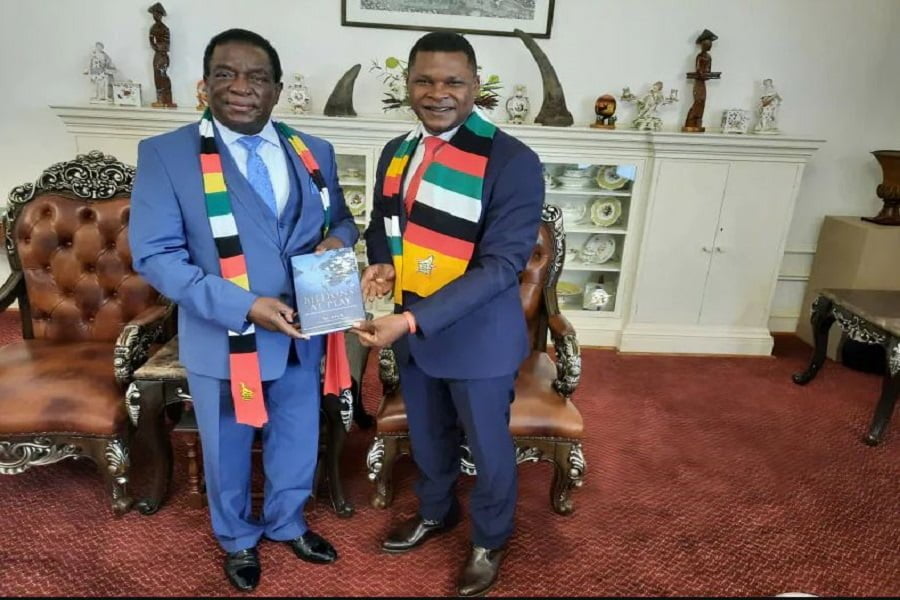Committed to driving attendance at the upcoming African Energy Week (AEW) 2021 interactive conference and exhibition taking place in Cape Town (November 9-12) – as well as promoting pan-African investment opportunities – NJ Ayuk, Executive Chairman of the African Energy Chamber (www.EnergyChamber.org), conducted a working visit to Zimbabwe to open a dialogue on the country’s promising energy sector. Meeting with H.E. Emmerson Dumbudzo Mnangagwa, President of Zimbabwe, and presenting his recently published book, ‘Billions at Play: The Future of African Energy and Doing Deals,’ Ayuk emphasized how AEW 2021 will position Zimbabwe as a top investment priority in November, driving development across multiple energy sectors.
Ayuk’s meeting with the H.E. President Mnangagwa focused on Zimbabwe’s energy potential and delineated strategies by which this potential can be achieved. Across the country, power generation and transmission remain some of the most critical investment opportunities, as existing coal-fired power stations require upgrades and untapped natural gas and renewable resources lack exploitation. Therefore, Zimbabwe is seeking new investors and projects to increase installed power generation capacity, diversify its domestic energy sector and boost country-wide energy security, in which AEW 2021 will be a key driver.
With approximately 30 billion tons of coal in 21 known deposits that could have a lifespan of over 100 years, Zimbabwe’s coal reserves have the potential to address energy supply challenges and meet demand across the region. Currently, the country’s largest thermal power station, Hwange Thermal Power Plant, has a capacity of 750MW, supplying critical electricity to the population. However, with ageing power plants requiring upgrades and the country opting to reduce its reliance on coal, alternative power generation solutions are being considered and significant investment opportunities have emerged.
Ayuk’s visit initiated a dialogue on one of the country’s most promising sectors: renewable energy. Zimbabwe is home to impressive hydropower potential – estimated at 18,500 GWh per year, of which 17,500 GWh is technically feasible – and aims to drive further investment and associated development to establish domestic energy security and independence. To date, only 19% of the country’s hydropower potential has been exploited, with most of Zimbabwe’s electricity supply produced at the 750MW Kariba Dam Hydroelectric Power Station. With further potential from the Zambezi River, as well as several small-scale prospects across the country, the resource could potentially position the country as a regional renewable competitor.
Furthermore, Zimbabwe holds significant exploration opportunities for stakeholders. Despite the lack of proven oil and natural gas reserves – and the continued dependence on crude imports to supply the nation – Zimbabwe is redirecting its focus on exploration, specifically of natural gas. Having experienced critical electricity shortages for decades, Zimbabwe is seeking alternative power generation solutions, in which natural gas may be a viable alternative. The Southern African nation is pursuing partnerships and investment deals with international stakeholders, focusing on accelerating exploration and driving energy sector diversification and growth.
Meanwhile, according to the International Trade Administration, Zimbabwe’s lithium deposits are the largest in Africa. With the rapid increase in global demand given the mineral’s importance to the energy-battery industry, the country has the potential to become a major exporter, while contributing to the global energy transition. To position itself as a clean energy player, Zimbabwe requires significant investment in mining, with additional opportunities available in mining supplies, transportation infrastructure and materials. In a bid to attract further investment, the government has proposed regulatory changes to the Mines and Minerals Act, making its more progressive and investor friendly. With a renewed interest in increasing domestic production, the government is seeking significant capital investments, in which AEW 2021 will play a major role.
“AEW 2021 is committed to promoting Zimbabwe. With established sectors requiring upgrades, and emerging sectors seeking international participation and investment, the country offers significant potential for both regional and international players. By showcasing these opportunities at Africa’s premier energy event, AEW 2021 aims to drive investment in Zimbabwe, initiating energy sector expansion and diversification,” stated Ayuk.
H.E. President Mnangagwa has declared a commitment to developing a robust energy sector in Zimbabwe to meet rising power demand brought about by an increasingly vibrant, productive and resilient economy and people. With significant potential across multiple segments of its energy economy, Zimbabwe hopes to attract both regional and international investment, utilizing its energy sector as a catalyst for wider socioeconomic growth. AEW 2021 aims to further this agenda, placing Zimbabwe as a top priority and showcasing all that the country has to offer.

